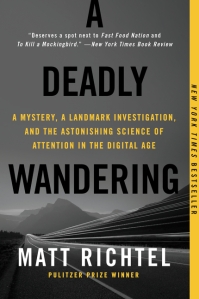We have Paleolithic emotions, medieval institutions, and godlike technologies.
E.O. Wilson (epigraph to A Deadly Wandering)The tragedy was the product of a powerful dynamic, one that elite scientists have been scrambling to understand, even as it is intensifying. It is a clash between technology and the human brain.
Matt Richtel, A Deadly Wandering
Every so often I read a book that inspires a certain evangelical fervor. I want everyone to read the book, because what the author has to say is original, compelling, and life-altering. When I read a book like this, I recommend it to everyone, without regard to reading tastes. I will even recommend it to people who don’t read much, reasoning that if they read ONE book this year, this should be the one.
A Deadly Wandering is one of those books I tell people they absolutely have to read. Pulitzer Prize winner Matt Richtel combines a groundbreaking legal case and the latest scientific research on the brain in a compulsively readable, multi-layered story about a devastating accident and the perils of multitasking in today’s digital world.
Just released in paperback, A Deadly Wandering has a new cover and a new subtitle. Despite my enthusiasm, I had a hard time selling the book in hardcover. Maybe I made it sound too much like a preachy public service announcement, rather than the engrossing and moving story it actually is. Or maybe the subtiitle was the problem: A Tale of Tragedy and Redemption in the Age of Attention. The new subtitle, A Mystery, A Landmark Investigation, and the Astonishing Science of Attention in the Digital Age, isn’t perfect either, but I guess the publisher couldn’t just call it A Deadly Wandering: Why You Shouldn’t Text and Drive. Whatever market research publishers use must have suggested to them that “mystery” and “investigation” appeal to more readers than “tragedy” and “redemption”.
 There’s actually not much of a mystery in A Deadly Wandering. The reader knows “whodunit”: 19-year-old Reggie Shaw crossed the center line on a Utah highway on a rainy morning in 2006, killing two people. As the investigation of the tragic accident progresses, it becomes clear to the investigative team that Reggie’s distracted driving caused the crash. Scott Singleton, a Utah State Trooper, and Terryl Warner, a victim’s advocate, are determined to bring Reggie to justice, and are frustrated by Reggie’s initial denial of responsibility, as well as the lack of community support for their crusade:
There’s actually not much of a mystery in A Deadly Wandering. The reader knows “whodunit”: 19-year-old Reggie Shaw crossed the center line on a Utah highway on a rainy morning in 2006, killing two people. As the investigation of the tragic accident progresses, it becomes clear to the investigative team that Reggie’s distracted driving caused the crash. Scott Singleton, a Utah State Trooper, and Terryl Warner, a victim’s advocate, are determined to bring Reggie to justice, and are frustrated by Reggie’s initial denial of responsibility, as well as the lack of community support for their crusade:
Some members of the community, while sympathetic to the victims, couldn’t understand the fuss. So what if he’d looked at his phone, or texted — haven’t we all been distracted behind the wheel? Who knew that was so wrong? The law was no help: Nobody in Utah had ever been charged with such a crime.
The real mystery isn’t how the crash happened, or why Reggie lied about it. Richtel delves into Reggie’s background, painting a sympathetic portrait of a young man who transforms himself from what the New York Times calls “a thoughtless, inadvertent killer” and “denier of his own culpability” to “one of the nation’s most powerful spokesmen on the dangers of texting behind the wheel”. The mystery is why we continue to jeopardize our lives, and the lives of others, by using technology while driving.
Dr. David Strayer, a human factors expert, is a pioneer in the application of attention science to driving. His research centers on an important question:
Why, given it was becoming clear that the brain faced limitations, were people continuing to multitask, particularly in challenging, even dangerous situations? When he first started his work on distracted driving, he just assumed people would stop the behavior when they realized how dangerous it could be. But when phone use by drivers continued, even grew, he was forced to reach another conclusion, one that vexed him. People didn’t stop using the technology, because they couldn’t.
 In an interesting follow-up to A Deadly Wandering, Matt Richtel published an article in the New York Times two days ago (5/31/15) called “Eyes on the Road. Head in the Cloud”, covering new devices that are designed to “provide safer ways for people to multitask while driving”. Is that possible? Psychologists and neuroscientists say it’s not.
In an interesting follow-up to A Deadly Wandering, Matt Richtel published an article in the New York Times two days ago (5/31/15) called “Eyes on the Road. Head in the Cloud”, covering new devices that are designed to “provide safer ways for people to multitask while driving”. Is that possible? Psychologists and neuroscientists say it’s not.
If A Deadly Wandering focused exclusively on cognitive science and the legal issues surrounding distracted driving, it would still be an interesting book. What elevates the book to page-turner status is Richtel’s treatment of the human beings involved. The reader becomes intimately acquainted with not only Reggie and his family, but other key players: the victims and their families, scientists, police investigators, attorneys, and legislators. The New York Times review points out that the story of Terryl Warner, a survivor of child abuse and a passionate advocate for crime victims, is “every bit as fascinating and redemptive as Shaw’s.” Everyone is trying to do his or her best under difficult and confusing circumstances.
Judge Thomas Willmore, the presiding judge on Reggie’s case, keeps cherished books in his chambers. One is “a beat-up paperback edition of Victor Hugo’s Les Miserablés, in which he’d underlined passages in red and blue pen. It touched on so much of what he faced: crime, rehabilitation, the role of the system for good and sometimes ill.” When Judge Willmore gives Reggie his sentence, he adds a final condition: requiring Reggie to read Hugo’s masterpiece, “which talks about a man who has done a terrible thing and makes it right again”.
Judge Willmore believes that redemption is possible. Reggie Shaw has pledged to devote the rest of his life to preventing others from making the same mistake he did. But, Richtel asks us, how can we come to terms with the addictive power of technology? I urge you to read this provocative book — and to share it with the new drivers in your family.
For more reviews, please visit TLC Book Tours, as well as From Reid’s Dad, a blog written by a father who lost his teenage son to a car crash. I also recommend The Deadly Wandering website, which includes a video of Richtel discussing the book and a quiz that measures your knowledge of current information about texting and driving. I’m embarrassed to admit that even after reading the book twice, I still didn’t do well on the quiz. If I were in school, I’d complain to the teacher that the material wasn’t covered in the book!

There are only a few books that I recommend to absolutely everyone and it has been a while since I’ve found a new one – I’ll definitely be checking this one!
Thanks for being a part of the the tour!
The Quiz was good. It makes you think. I’m all for less devices in the car. All states should make texting while driving illegal!